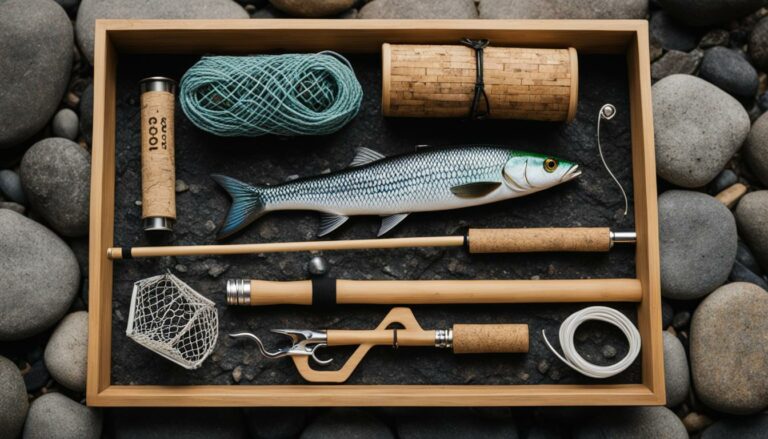Fostering Fishing Sustainability Education Now.

Education plays a crucial role in promoting fishing sustainability and protecting our waters. By raising awareness, encouraging responsible behavior, and creating future stewards, we can ensure a healthier ocean future. Join the movement for promoting fishing sustainability education and contribute to the protection of our waters.
Key Takeaways:
- Promoting fishing sustainability education is vital for protecting our waters and ensuring a healthier ocean future.
- Education raises awareness about responsible fishing practices and fosters a sense of stewardship.
- Join the movement to help preserve our oceans by promoting fishing sustainability education.
The Importance of Diversity and Inclusion in Aquaculture
Creating a diverse, equitable, and inclusive workforce is essential for innovation in sustainable fisheries and aquaculture. By promoting diversity and inclusion in the field of aquaculture, we can foster a more sustainable seafood industry that contributes to community health and climate resilience.
Organizations like Minorities in Aquaculture, American Fisheries Society’s Hutton Junior Fisheries Biology Program, Women in Aquaculture, and Kuaʻāina Ulu ʻAuamo (KUA) are already working towards this goal of diversity and inclusion. These organizations recognize the importance of representation and equal opportunities for individuals from all backgrounds and communities.
NOAA’s Office of Aquaculture is also actively addressing the issue by launching a diversity in aquaculture web series. This series aims to highlight the accomplishments, benefits, and barriers to diversity in the industry. By showcasing success stories and addressing challenges, this initiative aims to inspire and empower aspiring aquaculturists from diverse backgrounds.
Embracing diversity and inclusion in aquaculture is not only about fairness and equal opportunities but also about tapping into a pool of talent with varied skill sets, backgrounds, and perspectives. It is through collaboration and the blending of different ideas that we can effectively address the challenges of natural resource management and create a sustainable future for aquaculture.

The Benefits of Diversity and Inclusion
○ Diverse perspectives and experiences lead to creative problem-solving and innovation.
○ Inclusive environments promote better decision-making and result in more effective and sustainable practices.
○ Increased representation can lead to greater community involvement and support for sustainable seafood initiatives.
“Diversity is not about how we differ. Diversity is about embracing one another’s uniqueness.” – Ola Joseph
Building Pathways into STEM Fields for Aspiring Aquaculturists
Many aspiring scientists face challenges when pursuing STEM majors, such as limited recruitment, lack of representation, and unwelcoming environments. This can hinder their progress and lead to discouragement. However, it is crucial to establish pathways that encourage rising aquaculturists to pursue STEM fields, including aquaculture education.
One organization making significant strides in this area is NOAA’s José E. Serrano Educational Partnership Program with Minority Serving Institutions Cooperative Science Center institutions. This program has played a vital role in awarding Ph.D. degrees to black graduates in atmospheric science and marine science, increasing representation in these fields.
Furthermore, NOAA’s Aquaculture Program is collaborating with NOAA’s Office of Education to expand its reach and improve aquaculture outreach efforts. This collaboration aims to create an aquaculture literacy effort that will increase awareness and provide educational resources related to aquaculture.
Creating Opportunities Through Partnership
“By partnering with Minority Serving Institutions and investing in aquaculture education, we can create a more inclusive and diverse STEM workforce. This will not only benefit individuals from underrepresented backgrounds but also contribute to the growth and innovation of the aquaculture industry.”
– NOAA representative
Building pathways into STEM fields requires a multi-faceted approach. It involves creating mentorship programs, scholarships, and internships that specifically target aspiring aquaculturists. Additionally, initiatives should focus on fostering inclusive and supportive learning environments to overcome the challenges faced by underrepresented individuals.

Education also plays a vital role in fostering conservation efforts within communities. When individuals are educated about the threats facing marine life, they are more likely to engage in conservation initiatives and support organizations dedicated to preserving marine habitats. Through volunteering, participating in beach cleanups, and contributing to scientific research projects, educated communities actively contribute to the conservation of marine life.
Quotes:
“Education is the key to preserving our precious marine life. By raising awareness, encouraging sustainable practices, and fostering community involvement, education empowers individuals to become stewards of our ocean and its inhabitants.” – Dr. Samantha Davis, Marine Biologist
By empowering communities through education, we can create a collective effort to preserve marine life. Education raises awareness, promotes sustainable practices, and fosters conservation efforts, ensuring a future where our oceans thrive. Let us work together to protect marine habitats and safeguard the incredible biodiversity they hold.
Education Initiatives Making a Difference in Marine Life Conservation
Various education initiatives are playing a significant role in the conservation of marine life. These initiatives are focused on raising awareness, promoting sustainable practices, fostering community involvement, and driving research and innovation. Together, these efforts contribute to building a sustainable future for marine life.
“We cannot protect what we do not understand.” – Dr. Sylvia Earle
1. Ocean Literacy Programs
Ocean literacy programs play a crucial role in educating students about the importance of the ocean and its biodiversity. These programs provide students with a comprehensive understanding of marine ecosystems, their significance, and the need for their conservation. By instilling a sense of appreciation and respect for the ocean, these programs empower the younger generation to become stewards of marine life.
2. Marine Conservation Organizations
Marine conservation organizations are actively involved in raising awareness through campaigns and research. These organizations work tirelessly to educate the public about the threats facing marine life and the urgent need for conservation. Through their efforts, they inspire individuals to take action, make sustainable choices, and support initiatives that protect marine habitats and species.
3. Integration into Curricula and Vocational Training Programs
The integration of marine education into curricula and vocational training programs is crucial for fostering knowledge and understanding among future professionals. By incorporating marine conservation principles into various fields of study, such as biology, environmental science, and fisheries management, educational institutions equip students with the necessary skills to address environmental challenges and promote sustainable practices.
4. Local and Community Involvement
Local and community involvement is key to driving collaborative action for marine life conservation. Through community-led initiatives, individuals come together to protect their local marine ecosystems, promote responsible fishing practices, and engage in beach clean-ups and restoration efforts. By building a network of passionate individuals, communities contribute to the preservation of marine life on a grassroots level.
5. Research and Innovation
Research and innovation are essential components of marine education initiatives. By conducting scientific studies, researchers expand our knowledge of marine ecosystems, identify threats, and develop innovative solutions. This research informs conservation efforts and guides the implementation of sustainable practices. Additionally, innovation in technology and methodologies enables more efficient monitoring and management of marine resources.
These education initiatives, spanning from ocean literacy programs to community involvement and research, collectively contribute to the preservation of marine life. By increasing awareness, fostering sustainable practices, involving communities, and driving innovation, these initiatives pave the way towards a sustainable future for our oceans and the magnificent creatures that inhabit them.
Conclusion
Education is the key to preserving marine life and ensuring a sustainable future for our oceans. By raising awareness about the importance of marine conservation, promoting responsible behavior, fostering collaboration, and supporting research and innovation, education plays a crucial role in protecting our planet’s precious marine ecosystems.
Through educational initiatives, we can empower individuals to make a positive impact on marine life preservation. By equipping people with knowledge and understanding, education encourages sustainable practices and cultivates a sense of responsibility towards the environment. It is through education that we can inspire a new generation of marine stewards who will passionately work towards oceans protection.
Education not only enhances our understanding of marine ecosystems but also encourages active community involvement. By integrating marine education into curricula and vocational training programs, we can ensure that future generations are well-equipped to tackle the challenges of marine life preservation. Local and community involvement in conservation efforts fosters collective action and strengthens our commitment to protecting marine habitats.
As we move forward, we must embrace education as the cornerstone of a sustainable future for marine life. By investing in education, we invest in the preservation of our oceans and the countless species that call them home. Together, let us join hands and tirelessly work towards the protection and conservation of our marine ecosystems for the benefit of future generations.
FAQ
How does education promote fishing sustainability and protect our waters?
Education plays a crucial role in raising awareness, encouraging responsible behavior, and creating future stewards. By joining the movement for promoting fishing sustainability education, individuals can contribute to the protection of our waters and ensure a healthier ocean future.
Why is diversity and inclusion important in aquaculture?
Creating a diverse, equitable, and inclusive workforce is essential for innovation in sustainable fisheries and aquaculture. Organizations such as Minorities in Aquaculture, American Fisheries Society’s Hutton Junior Fisheries Biology Program, Women in Aquaculture, and Kuaʻāina Ulu ʻAuamo (KUA) are already working towards this goal. NOAA’s Office of Aquaculture is launching a diversity in aquaculture web series to highlight the accomplishments, benefits, and barriers to diversity in the industry.
How can we build pathways into STEM fields for aspiring aquaculturists?
Many aspiring scientists drop out of STEM majors due to limited recruitment, lack of representation, or unwelcoming environments. Building pathways into STEM fields, including aquaculture education, is crucial to encourage rising aquaculturists. NOAA’s José E. Serrano Educational Partnership Program with Minority Serving Institutions Cooperative Science Center institutions has played a significant role in awarding Ph.D. degrees to black graduates in atmospheric science and marine science. NOAA’s Aquaculture Program is expanding its reach by collaborating with NOAA’s Office of Education to increase aquaculture outreach and create an aquaculture literacy effort.
How does education contribute to marine life conservation?
Education is a powerful tool in marine life conservation. It raises awareness about the challenges faced by marine life and encourages responsible behavior. By empowering individuals with knowledge and understanding, education can create a global community dedicated to the preservation of our oceans. It promotes sustainable practices, fosters collaboration, and stimulates innovation for the future of marine life conservation.
What role does education play in building sustainable seafood systems?
The CMBC’s Sustainable Seafood Initiative focuses on the intersection of sustainable fisheries management with seafood supply systems. Education plays a vital role in effectively communicating the sustainable seafood landscape, fostering engagement, promoting corporate responsibility, and building capacity within the seafood industry. Through science, engagement and communication, and capacity development, the initiative aims to create a re-envisioned seafood system that links fish to food and integrates sustainable practices.
How does education empower communities in marine life preservation?
Education is key to empowering communities in the preservation of marine life. By raising awareness about the importance of marine life conservation, encouraging sustainable practices, and fostering conservation efforts, education plays a crucial role in empowering individuals to make a difference. It creates a sense of responsibility towards the environment and promotes actions that minimize harm to marine habitats.
What are some education initiatives making a difference in marine life conservation?
Various education initiatives are making a significant impact in marine life conservation. Ocean literacy programs educate students about the significance of the ocean and its biodiversity. Marine conservation organizations raise awareness through campaigns and research. Integration of marine education into curricula and vocational training programs is crucial. Local and community involvement promotes collaborative action. Research and innovation contribute to sustainable practices. These initiatives collectively play a vital role in building a sustainable future for marine life.
How does education contribute to marine life preservation and a sustainable future?
Education is a powerful tool in preserving marine life and ensuring a sustainable future. By raising awareness, encouraging responsible behavior, fostering collaboration, and supporting research and innovation, education plays a crucial role in protecting our oceans and their inhabitants. Embracing education as the key to a sustainable future for marine life, individuals can work towards the preservation of our planet’s precious marine ecosystems.






